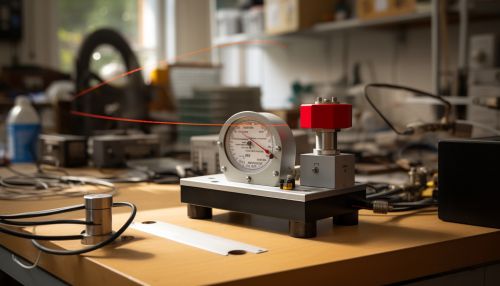Magnetometer
Introduction
A Magnetometer is a scientific instrument used to measure the strength and, in some cases, the direction of the magnetic field in a given area. Magnetic fields can be either natural, such as the Earth's magnetic field, or man-made, like those created by electronic devices. Magnetometers are essential tools in various fields, including geophysics, archaeology, and space exploration.
History
The first magnetometers were developed in the 19th century and were based on the principle of compass needles. These early devices were able to detect changes in the Earth's magnetic field, but they were not very accurate. The development of the proton precession magnetometer in the 1950s marked a significant advancement in the field. This device uses the precession of protons in a magnetic field to measure its strength, providing a much more accurate reading than previous models.


Types of Magnetometers
There are several types of magnetometers, each with its own advantages and limitations. The most commonly used types include the proton precession magnetometer, the fluxgate magnetometer, the Hall effect magnetometer, and the SQUID (Superconducting Quantum Interference Device) magnetometer.
Proton Precession Magnetometer
The proton precession magnetometer is a type of scalar magnetometer that measures the total strength of the magnetic field. It operates based on the principle of nuclear magnetic resonance, where protons in a magnetic field precess at a frequency proportional to the field's strength.
Fluxgate Magnetometer
The fluxgate magnetometer is a type of vector magnetometer that can measure both the strength and direction of a magnetic field. It uses a pair of iron-core coils to detect changes in the magnetic field.
Hall Effect Magnetometer
The Hall effect magnetometer operates based on the Hall effect, where a voltage difference is created across an electrical conductor in response to a magnetic field. This type of magnetometer can measure both the strength and direction of a magnetic field.
SQUID Magnetometer
The SQUID magnetometer is one of the most sensitive types of magnetometers. It operates based on the principle of superconductivity and can detect extremely small changes in the magnetic field.
Applications
Magnetometers have a wide range of applications in various fields. In geophysics, they are used to study the Earth's magnetic field and to detect magnetic anomalies in the Earth's crust. In archaeology, magnetometers can detect buried archaeological features by measuring variations in the Earth's magnetic field caused by these features. In space exploration, magnetometers are used to study the magnetic fields of other planets and to detect solar flares. They are also used in navigation, mineral exploration, and unexploded ordnance detection.
